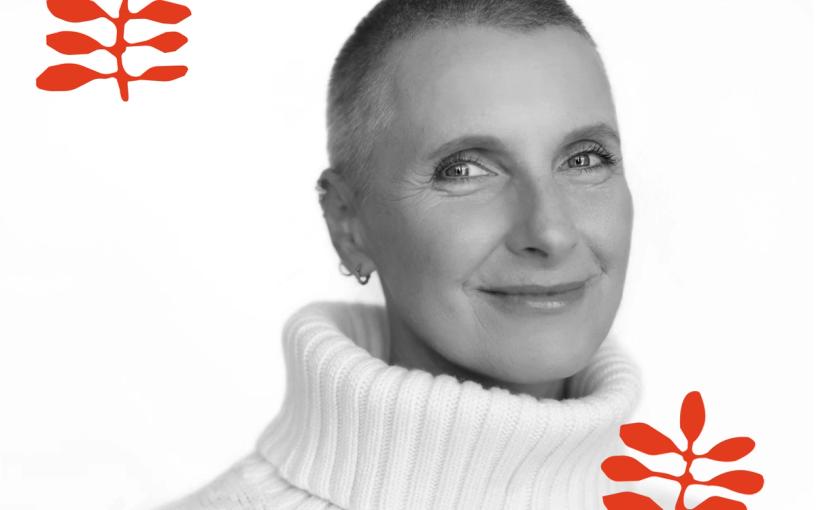
Dr. Amy K. Siston, PhD
Amy Siston, PhD, is a clinical health psychologist at the University of Chicago with dual expertise in psycho-oncology and sexual health. Dr. Siston focuses on providing support and care for cancer patients and survivors, including addressing the impact cancer has on quality of life and sexual health and intimacy.
Dr. Amy Siston loves her job, partly, because she does something really important that very few people can comfortably admit is really important: she helps people have good sex. As a psychologist and sex therapist at the University of Chicago specializing in oncology, Dr. Siston helps her patients regain something they’ve (often) lost during their cancer experience; and sometimes helps them for the first time get language and clarity about the sex they always wish they were having.
We talked to Dr. Siston about all things cancer and sex—all the different ways cancer can affect sex, and what we can do about it.
Q:
First: can you tell us how you define sex therapy?
A:
Sex therapy is traditional psychotherapy. We use pieces of cognitive behavioral therapy, acceptance and commitment therapy, but specifically designed around addressing sexual issues, that can be issues of desire, orgasm difficulties, pain with intercourse, difficulties with arousals, and trauma histories too.
The cornerstone of sex therapy is sensate focus, a structured series of exercises typically practiced with a partner. This gradual, mindfulness-based approach is designed to help individuals who experience anxiety or pain during sexual activity by reducing performance pressure and promoting relaxation, bodily awareness, and enjoyment of sensual touch.
Q:
What does sex mean to you?
A:
In the beginning when I started doing therapy some time ago, asking about someone's sexual function or sexual health may have not been standard practice. Today, for me and anybody that I trained, it is part of our evaluation, as part of our care for the patients that we work with.
So I see it as a quality of life issue. I see it as, you know, something that's very personal, something that does not always get addressed in regards to a diagnosis or treatment or a follow up visit. It's not being asked about. It's something that patients keep quiet, and sometimes their providers keep very quiet, too. I see it as something that needs to be addressed.
It's about giving the patients the space to talk about it, giving them permission to talk about and really normalize their experience. And certainly, we give them hope that we have ways to work with these issues. You don't have to not ever have sex again. There may be ways to adjust or to adapt to what's going on with your changing body from cancer in order to have a fulfilling sexual life.
Q:
How does cancer affect sex, both physically and emotionally?
A:
Cancer has the ability to impact emotional, physical, social intimacy, in all different ways. Cancer can cause or contribute to a lot of anxiety, a lot of fear, sadness, sometimes for patients, but also for their partners. Cancer can also contribute to changes in the body, from treatment, being really tired, having pain, changes in the way you relate to one another. Sometimes couples get a bit closer, sometimes couples get further apart and relationships change.
Q:
You say some couples can get closer, and some drift further. Can you tell us more about what you observe?
A:
I think if there's already problems in the relationship before cancer, those problems are probably still going to be there, and sometimes they get bigger. If it's a solid relationship before cancer, I think folks get even closer. It's all about one's willingness to talk about these issues, to communicate, to have the space.
A lot of focus, when someone's diagnosed with cancer, is on the patient. Not many people check in on the partner, so often the partners feel left out. Partners feel very alone. They're not checking in on each other, so that can create some distance or some avoidance.
Q:
And how might those difficulties transfer to their sex life?
A:
If they don't talk about it, that's a problem.
Actually, cancer, in terms of sexual functioning, can really open the door to starting to have these conversations that they never had before. Now, they have to communicate what's comfortable, what's less painful. Maybe we have to talk about a different position that's more comfortable. Maybe I talk about the discomfort with the way my body looks or the scars that I have, and you help me out with that. Maybe you say, ‘Would you be okay if I wore a piece of clothing while we’re having sex or kept the light dim, because that's where I feel comfortable right now?’ We need to work together as a couple to talk about it. That takes a lot of the burden off the patient, if they can work as a couple.
Communication is really important. They need to work together. This isn't: ‘You have cancer, now you have this sexual issue, this is your problem.’ This is a “we” problem that we have to work on together.
Q:
A lot of people in cancer treatment will experience early menopause. How does that affect sex?
A:
They can experience things like vaginal dryness, thinning of the vaginal tissue, pain with intercourse, loss of libido. What a lot of women will say is: ‘I have no libido, I have no drive anymore.’ And they're also dealing with other difficulties, like having hot flashes, and hot flashes at night that wake you up, so you don't sleep very well.
Many patients say, like; I don't feel like a woman anymore. I don't care if I ever have sex again. I'm trying to be sexual for the sake of my partner. I feel guilty. That’s why I'm having sex. I feel bad for my partner.’ And some say, ‘I just want the emotional closeness. It's not about having sex. I just want to feel close.’
Q:
What do some conversations with your patients look like, when they’re trying to activate some sex drive or desire?
A:
For some, they may not have the desire to start, but once they get involved in some kind of intimacy, they will respond to that experience and feel desire. That’s called responsive desire. So, they may not have that spontaneous desire, but after getting involved, if there’s touch, if there’s emotional closeness, they might respond to that and they’ll desire to have more.
With my guidance, we work to get back in touch with what they're feeling in their body, more present moment awareness, how does that feel to be touched? How does it feel when I touch my partner? How does the sheet feel? What does it smell like? You know, right now. Using the senses to help one to stay present.
Thoughts can distract from present moment awareness. I like to say you have too many tabs open. Try and just recognize that the thoughts are there, rather than get caught up in them. They're worried about something. They're not in the place of being intimate. If you're distracted by these other things, you're not enjoying what's happening now. It's like if you have a really good meal and then you're on the computer working. You're just doing it as a matter of doing it. How different it is to really look at it, to see the colors, to enjoy the smell, and really savor the taste. That's what we want.
Q:
Cancer treatment is well-known for causing changes in the body. How do you talk to your patients about body image and sex?
A:
Body image issues are a common concern with cancer survivors. There may be loss of body parts, insensitivity or pain with touch, hair loss. I think patients really have to feel comfortable with these changes before they allow somebody in. How does my partner see me now? Does my partner still see me as attractive? Does my partner still see me as sexy? That one takes a little time.
If there is discomfort you can make adjustments. Can we keep the lights low? You can keep clothing on, or a wig on, or a scarf on. These are gradual things that can change with time. But again, body image, there's a lot of vulnerabilities with that. There's a lot of fear.
Women who have undergone mastectomy following breast cancer often experience a loss of breast sensation—an area that can be highly erogenous for both themselves and their partners. Many women struggle deeply with this change, feeling disconnected from their bodies or perceiving their breasts as no longer part of their sexual identity. Encouraging a focus on the body as a whole, rather than isolated parts, can be an important step in restoring intimacy and body connection.
Q:
To address a common, pervasive symptom: what advice do you give to patients who experience fatigue?
A:
The way to work with fatigue is scheduling. If you're worn out by 4 o'clock, you probably don't want to be having sex at 9 o’clock. It may mean that you have to plan to have sex earlier, or plan to take a nap during the day.
The heart of sex therapy is sometimes making a recommendation to schedule intimate activity. We get a lot of resistance to scheduling because everyone says, ‘Oh, we want things to be spontaneous. We don't want a plan. That's not natural.’ But in fact, people are planning a dinner, they’re planning what to wear to that dinner. They’re planning what they might do after they go out on a date. There is a lot of planning in life. We're just really trying to solidify it a little bit more, be a little bit more concrete about it.
By doing this, you can have a little bit more control over what that schedule looks like and how you feel that day.
Q:
I think some people could have that response to a lot of this advice, that it requires so much effort, sex they had before is spontaneous, and spontaneous sex seems like the ideal. What would you say to that?
A:
Working on sexual health will require effort. It will require attention. What someone used to do and not even give thought to, they really have to give thought to now. They have to make sure they have a lubricant. Maybe they’ve done some dilator work. [Menopause can often cause your vagina to become drier, and less elastic—a vaginal dilator is a tool you can use to gradually stretch your vaginal/pelvic floor muscles to help with this.] If they have vaginal pain, maybe they talk to their partner, maybe they remind their partner, like we have to do foreplay a little bit longer.
It takes continual work, and that could be really frustrating. A lot of patients get angry, they get angry at the cancer, they get angry at their bodies. But I think the more we can talk about it and work on it, you can see really positive results and hopefully, create a new sexual space that may be better than what the previous one was before cancer.
Q:
How can we normalize these conversations and make them less stigmatizing?
A:
Somebody once said to me, ‘If I was at the clinic and they advertised what you do, I would secretly try to write down the number so nobody would see me rather than going up to the desk and asking about it.’ So there is definitely a lot of stigma associated with it.
A lot of sex issues do not just go away with the passage of time, in fact, they may get worse. We can get in front of it. We can be better at giving them the tools to kind of rebuild or recreate a different intimate space, I think, better.
It can be very empowering, too. It can give them back some of the control that they lose with cancer. There's a lot of losses with cancer, so the more we can do things to help them regain some of the losses that they've had, the better, and I think sexual health is a big one of those.









